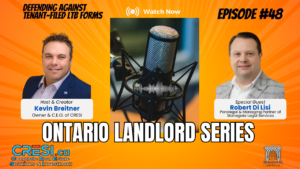Ontario Landlord Court Options: The Hidden Legal System Protecting Your Investment
In this episode of the Ontario Landlord Series, Kevin Breitner sits down with landlord litigation expert Gibrian Malicki-Sanchez to explore the Ontario landlord court options that many property owners don’t even know exist. If you’ve ever wondered what happens when the Landlord and Tenant Board says “we can’t help you,” this conversation reveals the three alternative legal paths that could save your investment.
Picture this: You’re an Ontario landlord with a real problem. Your tenant hasn’t paid rent in months. Maybe they’ve damaged your property. You go to file with the Landlord and Tenant Board. You think they’ll fix everything.
Then you get news that crushes you: “Sorry, we can’t help with your case.”
What now? The answer is simple. You need to know all your Ontario landlord court options – because the LTB is just the start.
When the LTB Says No: Ontario Landlord Legal Help That Actually Works
Most Ontario landlords think the Landlord and Tenant Board is their only choice. That’s what property owners are told to think. But here’s what the rental business doesn’t tell you: landlord court options in Ontario go way beyond the LTB.
The truth hurts. Thousands of landlords get turned away from the LTB every year. Not because their cases are bad. Not because they don’t need help. But because their problem falls outside the rental law.
Smart property owners know there are three powerful Ontario landlord court options waiting to protect their money.
Small Claims Court: Your $50,000 Secret Weapon This October
Small Claims Court just became every Ontario landlord’s best friend. Starting October 2025, you can sue for up to $50,000. That’s $15,000 more than right now.
Think about what this means for your rental business. Property damage that seemed too costly to chase? Now it’s worth your time. Rent money that piled up over months? You can go after all of it.
This Ontario court option for landlords handles money fights that the LTB won’t touch. But here’s the trick most landlords miss: timing matters. File in the wrong court at the wrong time, and you could lose everything.
Superior Court: When Ontario Landlord Fights Get Big
For damage over $50,000 or tough eviction cases, Superior Court becomes your heavy-hitting Ontario landlord legal option. This court has no limits and can handle the big-money fights that smaller courts can’t touch.
Rent-to-own deals gone wrong? Superior Court. Major property damage from bad tenants? Superior Court. Complex contract fights that go beyond simple rent? You guessed it – Superior Court.
The Airbnb Trap: When Standard Ontario Landlord Court Options Don’t Work
Short-term rental owners get hurt the most by LTB rejection. Your Airbnb guest trashed your place? The Board won’t touch it. Student housing causing problems? Not their job.
Even sharing a kitchen or bathroom with your tenant kicks you out of LTB territory. Suddenly, you’re on your own with no clear path forward.
This is where knowing all your court options for Ontario landlords becomes crucial. The right court can still get you the money you’re owed and get the problem tenant out.
Provincial Offenses Court: The Ontario Landlord’s Secret Power Tool
Here’s an Ontario landlord court option most property owners never hear about. If your tenant changes locks without asking or stops you from doing repairs, they’ve broken the law.
The fine? Up to $50,000.
This isn’t just about money. It’s about showing that landlords have rights too. But you can’t threaten this action to make tenants cooperate. That’s against the law. You have to decide to use it or not.
The Main Issue Test: Picking the Right Ontario Court System
Courts use something called the “Main Issue Test” to decide who handles what. This test looks at the heart of your fight. Is it really about the rental relationship? Or is it about something else?
Understanding this test helps you pick the right Ontario landlord court option from the start. Get it wrong, and your case gets thrown out before you even begin.
Why Smart Ontario Landlords Use Multiple Court Systems
The most successful property investors don’t rely on just one court. They understand how to use different Ontario landlord court options for maximum protection.
Rent-to-own deals create a perfect example. When these deals go wrong, smart landlords can chase damages in Superior Court while handling eviction through the LTB. It’s like having two legal tools instead of one.
Don’t Face Ontario Landlord Court Options Alone
The biggest mistake Ontario landlords make is trying to handle these court systems for landlords in Ontario without help. Each court has different rules, different timing, and different ways to win.
Property investment should make your life easier, not turn you into a part-time lawyer. Knowing when to call in an expert who understands all your Ontario landlord court options can save you thousands in legal costs and lost rental income.
The rental market in Ontario is tough enough without fighting the wrong battle in the wrong court. Your investment deserves protection, and now you know there are more Ontario landlord legal options than you thought.
Related: Stress-free tools for landlords



